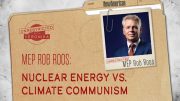
Roberts warned that the implementation of the new rule was beyond the legal authority of the EPA and that the standards — 1,100 metric tons of carbon dioxide per megawatt hour — would, as a practical matter, mean the end of coal-fired power plants in America:
This rule is an all-out, in my opinion, decision by the EPA that we’re never going to have another coal-fired facility in the United States that’s constructed. I noticed this past week the vice president was talking about the campaign and he mentioned that Osama Bin Laden was dead and General Motors was alive. He should have gone on to say that the coal industry is not far behind with respect to what happened to Osama Bin Laden.
The United Mine Workers Association president, whose group supported Obama in his 2008 presidential campaign, was particularly upset that while coal continues to be the fastest growing energy source in the world, the Obama administration has turned its guns on that industry.
The United Mine Workers Association have issued a statement noting that the technology which that enable coal-fired plants to meet the newly proposed standards is not yet available and may not be for many years.
Representative Morgan Griffith (R-Va.) — who defeated 14-year Congressman Rick Boucher last November in one of the bigger upsets of 2011, largely on the issue of the impact of EPA greenhouse gas emission standards on the coal industry — concurred with the UMWA president:
In my opinion, these new regulations make it crystal clear that the Obama Administration wants to end the use of coal in our country. Coupled with last year’s utility regulations, I believe this new rule will undoubtedly lead to higher energy prices for the average American family and the average American business. If the president has his way, coal will be out of business in America.
Though America has the largest recoverable coal reserves in the world — over 27%, compared to the next largest reserves of 17% in Russia — U.S. coal production is under 15% of the global total. China, with far less coal, is producing over three times as much as the United States.
Analysts have noted that extracting coal from the Appalachian region, where much of the nation’s high-grade coal is located, would generate large numbers of good-paying jobs — jobs which would in turn sustain economies in some of the poorest parts of America. That coal would reduce U.S. demand for imported oil. Coal-fired power plants can also reduce the cost of electricity, making the cost of industrial operations in America more competitive.
And, as Cecil Roberts pointed out, allowing the coal industry to grow will also provide good-paying jobs to the very union members who have historically supported the President’s party. Observers will be interested to see just how much support these industrial unions will give to President Obama in November's election.



